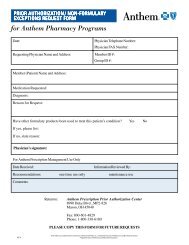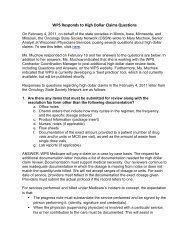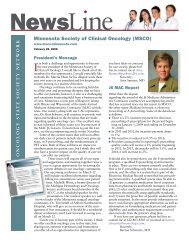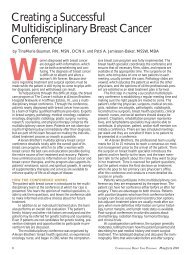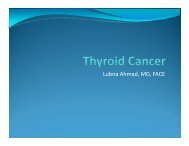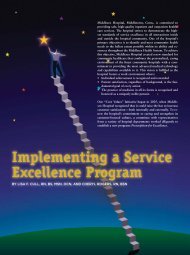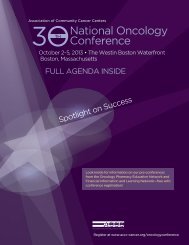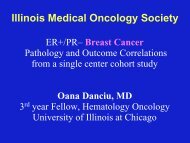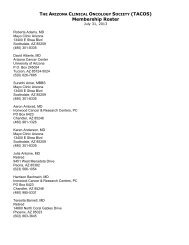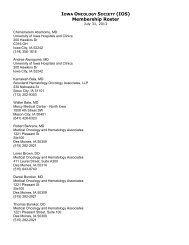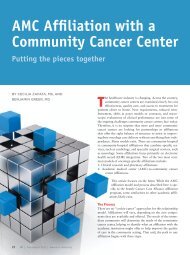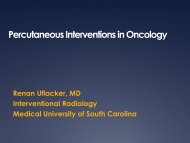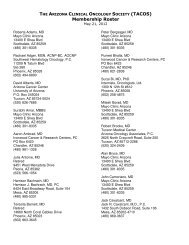Cancer Program Guidelines - Association of Community Cancer ...
Cancer Program Guidelines - Association of Community Cancer ...
Cancer Program Guidelines - Association of Community Cancer ...
Create successful ePaper yourself
Turn your PDF publications into a flip-book with our unique Google optimized e-Paper software.
Academy <strong>of</strong> Nutrition and Dietetics* Standards <strong>of</strong><br />
Practice and Pr<strong>of</strong>essional Performance for Registered<br />
Dietitians (Generalist, Specialty, and Advanced) in<br />
Oncology Nutrition Care.<br />
G. A plan is in place regarding ongoing pr<strong>of</strong>essional development<br />
for the nutrition pr<strong>of</strong>essional, including regularly<br />
scheduled in-service and continuing education programs<br />
through national and regional pr<strong>of</strong>essional organizations<br />
(e.g., the Oncology Nutrition Dietetic Practice<br />
Group <strong>of</strong> the Academy <strong>of</strong> Nutrition and Dietetics) and<br />
community-sponsored programs specific to oncology<br />
nutrition. *Effective January 2012, Academy <strong>of</strong> Nutrition<br />
and Dietetics (AND) became the new name for the<br />
American Dietetic <strong>Association</strong>.<br />
Guideline II<br />
The nutrition pr<strong>of</strong>essional with the patient, family, and<br />
the oncology team manages issues involving the patient’s<br />
nutrition and hydration status through appropriate<br />
nutrition screening, assessment, and intervention across<br />
the care continuum.<br />
Rationale<br />
The nutritional needs <strong>of</strong> patients are unique to each<br />
individual.<br />
Characteristics<br />
As part <strong>of</strong> the nutrition care process, the nutrition<br />
pr<strong>of</strong>essional:<br />
A. Develops and implements a screening program to<br />
identify and prioritize patients at risk for malnutrition. <br />
B. Formulates an individualized nutrition care plan based<br />
on assessment findings. <br />
C. Provides anticipatory guidance, identifying common<br />
nutritional problems the patient may encounter during<br />
the course <strong>of</strong> his/her disease and treatment. <br />
D. Addresses side-effect management, complementary<br />
and alternative medicine (CAM) issues (e.g., herbs,<br />
supplements, vitamins, and minerals) in the context <strong>of</strong><br />
evidence-based nutrition care, and services across the<br />
care continuum (prevention, treatment, survivorship,<br />
palliative care, and hospice).<br />
E. Monitors the patient’s progress and provides follow-up<br />
nutrition care, as needed. <br />
F. Assesses the patient’s and/or family’s ability to<br />
understand and comply with nutritional education and<br />
instruction and modifies interventions appropriately. <br />
G. Collaborates in the patient’s care with his/her<br />
physician(s) and other members <strong>of</strong> the oncology team. <br />
H. Evaluates nutrition care outcome indicators.<br />
Guideline III<br />
The nutrition pr<strong>of</strong>essional serves as a resource and<br />
provides nutrition and diet information about reducing<br />
cancer risk and cancer recurrence risk through<br />
educational program materials and services to the<br />
community.<br />
Rationale<br />
Lifestyle interventions that are associated with reduced<br />
cancer risk also address chronic disease as a whole, improving<br />
the health and knowledge base <strong>of</strong> the community that the<br />
cancer center serves.<br />
Characteristics<br />
A. The nutrition pr<strong>of</strong>essional provides dietary and lifestyle<br />
guidance associated with reduced cancer risk through<br />
the delivery <strong>of</strong> educational materials, programs, and<br />
services to the community. <br />
B. The nutrition pr<strong>of</strong>essional works with health pr<strong>of</strong>essionals<br />
and educators to provide evidence-based information<br />
about lowering cancer risk, both for primary prevention<br />
and to prevent recurrence and secondary cancers in<br />
survivors.<br />
Guideline IV<br />
The nutrition pr<strong>of</strong>essional manages nutrition and<br />
diet-related needs specific to each patient’s<br />
individualized survivorship plan.<br />
Section 9<br />
Rehabilitation Services<br />
Guideline I<br />
Comprehensive rehabilitation services are available<br />
to cancer patients and their families through the<br />
entire cancer care continuum from diagnosis through<br />
survivorship.<br />
Rationale<br />
<strong>Cancer</strong> is a chronic disease that may require adjustment in<br />
the physical, social, financial, and emotional aspects <strong>of</strong> life<br />
in order to maximize independence and quality <strong>of</strong> life within<br />
medical status. Pr<strong>of</strong>essionals experienced in rehabilitation<br />
are best suited to meet these needs <strong>of</strong> cancer patients.<br />
ACCC <strong>Cancer</strong> <strong>Program</strong> <strong>Guidelines</strong> Chapter 4 Clinical Management and Supportive Care Services 19



